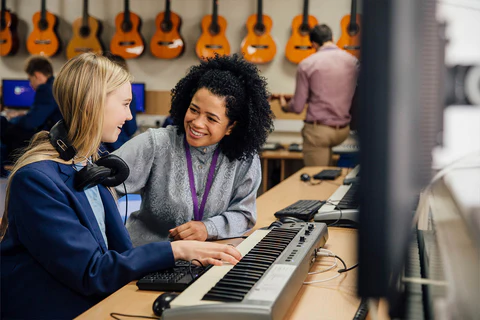A Comprehensive Guide to Community Music Education: Programs, Benefits, and Best Practices
Why Music Matters in Community Building
Music is a conduit for cultural exchange and understanding, offering a unique avenue through which communities connect. Whether through communal singing, public concerts, or school music programs, music brings individuals together, fostering relationships that might not form in other settings. A key element in sustaining these activities is the support schools receive via targeted initiatives such as grants for music teacher programs. These grants provide essential school resources to offer diverse music education opportunities, enhancing community cohesion.
Moreover, music serves as a powerful expression of identity. It fosters a sense of belonging and can convene diverse groups around shared values and goals. This shared music-making experience establishes an emotional bond among participants, bridging community cultural and demographic divides.
Benefits of Music Education for Students
The advantages of music education extend into multiple facets of student life, contributing to their academic, social, and personal development. Engaging in music education has been correlated with improved performance in mathematics and languages, demonstrating the cross-disciplinary benefits of music learning. Skills such as discipline, attention to detail, and collaboration are honed as students engage in ensembles or solo performances. These attributes are invaluable, enhancing students’ ability to succeed across various subjects.
Furthermore, music education encourages an appreciation of cultural differences and promotes inclusivity. Students exposed to music from different traditions develop a broader perspective, strengthening their capacity for empathy and understanding in an increasingly interconnected world.
Music and Cognitive Development
Research, including studies published by Science Daily, underscores the significant cognitive benefits of music education. Music learning is often associated with enhancements in neural processing and the development of critical cognitive skills. For instance, children who engage in music studies show superior abilities in language processing and reading comprehension tasks. These skills are not insular; they often translate into other academic domains, providing students with a robust foundation for lifelong learning.
Playing an instrument or singing engages various brain regions simultaneously, fostering brain plasticity and improving memory retention. This brain workout is akin to mental exercise, strengthening pathways crucial for varied intellectual tasks.
Emotional Growth Through Music
Beyond its intellectual benefits, music education is instrumental in aiding emotional maturity and regulation. Students learn to express emotions, manage anxiety, and build social relationships by participating in musical activities. This process fosters emotional intelligence, allowing young people to navigate the complexities of social interactions with increased sensitivity.
Additionally, music encourages self-confidence and resilience. Students often learn through trial and error, persistence, and reflection. These experiences build emotional resilience, helping them respond to successes and setbacks with a balanced perspective. It’s an enriching journey that equips them with life skills essential beyond school.
Music Programs Creating Impact
Numerous educational institutions have successfully integrated music programs into their curricula, leading to remarkable student engagement and academic performance improvements. These programs serve as a source of motivation and a catalyst for creating a vibrant and stimulating learning environment. By incorporating music, schools foster a sense of community and excitement that encourages students to participate actively in their education.
Moreover, these music programs illustrate the effective integration of music with other academic subjects, enhancing students’ overall educational experience and nurturing their creative talents. For instance, music education can complement subjects like mathematics through rhythm and patterns or improve language skills by exploring lyrics and poetry. Students cultivate their critical thinking and problem-solving skills by listening to music and tackling problems creatively. These skills are highly valued in today’s workforce, making integrating music into education beneficial for personal growth and future career opportunities.
Music Education Best Practices
Ensuring effective music education requires a holistic approach encompassing curriculum design, teacher empowerment, and resource availability. Best practices in music education advocate for inclusive curricula that respect and incorporate diverse musical traditions and student backgrounds. Professional development for educators is also crucial, enabling them to effectively employ the latest pedagogical techniques and insights to cultivate student talent.
Investments in instruments, technology, and facilities are equally important. They ensure that students have the tools to practice and perform at their highest potential. Creating an environment where students feel supported and inspired to explore their musical interests can profoundly affect their overall education experience.
Success Stories
Real-world examples of thriving music programs offer compelling testimonials of the transformative power of music education. Institutions with integrated, comprehensive music programs note significant improvements in student behavior, school attendance, and academic performance. These programs foster a school culture that values arts as much as academics, providing a balanced approach to student development.
Sharing these success stories can inspire similar initiatives worldwide, demonstrating the impact of music in creating harmonious and productive learning environments that extend beyond traditional academic metrics.
Challenges and Solutions
While music education has clear benefits, it faces challenges such as funding constraints and disparities in access to quality programming. Overcoming these hurdles requires concerted efforts from communities, educators, and policymakers. Strategic planning and advocacy for music education are vital in securing necessary funding and resources.
Collaborative efforts between schools and the community and strategically utilizing grants and sponsorships can help bridge these gaps. By fostering partnerships and valuing music as a core component of education, these challenges can be addressed, ensuring that the benefits of music education are available to all students.




